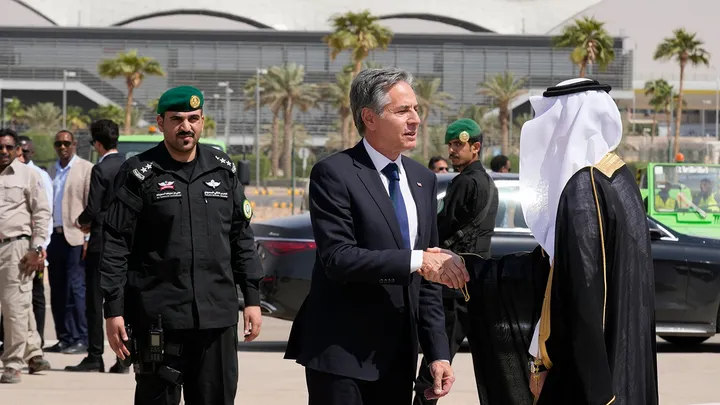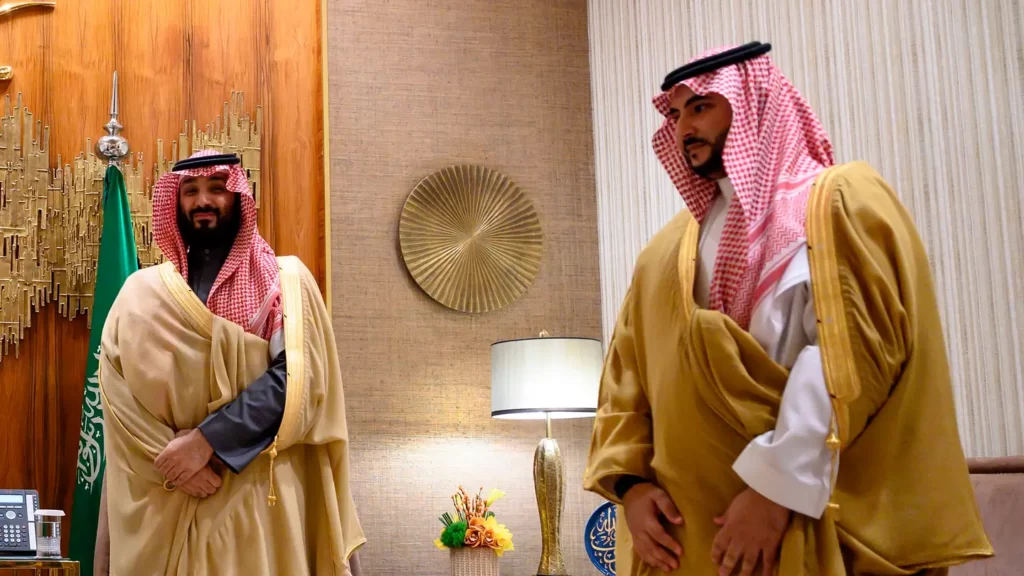Saudi Arabia reportedly shot down a cruise missile from Yemen to defend its airspace
Saudi Arabia’s defense minister will visit the White House this week in an effort to ease regional tensions in the Middle East. The visit comes in the wake of reports indicating that the kingdom intercepted a missile fired from Yemen that was allegedly aimed at Israel.
Salman al-Ansari, an independent geopolitical analyst based in Saudi Arabia, emphasized the Saudi perspective, saying, “I can tell you that Saudi Arabia wants the U.S. to fully realize the significant implications of Israel’s ground invasion of Gaza.” Riyadh hopes to urge Washington to use critical thinking and refrain from supporting decisions that could have negative consequences on US interests and the wider region.
Saudi Defense Minister Khalid bin Salman will visit Washington on Monday for talks with senior officials in the Biden administration, Axios reported, citing three sources familiar with the trip. Khalid bin Salman, the brother of Saudi Crown Prince Mohammed bin Salman and a former ambassador to the US, is the most senior Saudi official to visit Washington since President Biden took office.

‘Joe Biden is very much alive,’ Kamala Harris says ahead of 2024
National Security Adviser Jake Sullivan, Defense Secretary Lloyd Austin, Secretary of State Anthony Blinken, and other top officials are expected to participate in the meetings, as noted in the report.

Saudi Arabia warned on Saturday that “any ground operation by Israel will threaten the lives of Palestinian civilians and result in inhumane casualties.”
There have been several delays in Israel’s much-anticipated ground offensive, with the U.S. and other Western allies urging Israel to hold off until it releases 220 hostages believed to be held by Hamas. Israeli Prime Minister Benjamin Netanyahu announced on Saturday night that the Israel Defense Forces (IDF) would carry out a “second phase” of ground operations, but would not announce or launch any large-scale offensive.
Salman al-Ansari cast doubt on the possibility of Israel launching such an attack, suggesting that the widely publicized attack would serve primarily as a form of propaganda for domestic and international audiences.
Al-Ansari stated that he had strong reservations about whether the Israeli cabinet was in alignment with regard to their response strategy. He stressed that there appears to be considerable disagreement within Israel’s leadership regarding the move.

Moreover, he suggested that the US signal to Israel that Israeli Prime Minister Benjamin Netanyahu should be cautious. Al-Ansari believes that Netanyahu’s approach could lead to repeating significant historical mistakes.
Tensions have been high in the Middle East since the October 7 Hamas terrorist attack that killed 1,400 Israelis and kidnapped more than 220 hostages – some of whom were released in the following weeks.
Israel responded with the systematic bombing of the Gaza Strip and shelling against Hamas military targets, but the Hamas-backed Gaza health ministry said the health ministry in Gaza has killed 8,000 Palestinians, including many women and children, due to collateral damage.
Hezbollah militants in Lebanon and Houthi militants in Yemen have launched attacks on Israel since October 7, threatening to spread the conflict across the Middle East.
The USS Carney successfully intercepted and neutralized four cruise missiles and numerous drones that were launched from Yemen by Houthi militants with support from Iran. However, according to a report in the Wall Street Journal, Saudi Arabia also intercepted a fifth missile launched by the Houthis as a measure to safeguard its airspace.
The Saudi Arabian Ministry of Foreign Affairs has not provided an official response to a request for comment from Fox News Digital regarding these actions. While some individuals have suggested that Saudi Arabia’s actions can be interpreted as a defense of Israel, Salman Al-Ansari emphasized that Saudi Arabia’s primary motive was to protect its own airspace.

Salman Al-Ansari emphasized that regardless of the conflict in Gaza, Saudi Arabia, like any other nation, would intercept any missile that crosses its airspace, regardless of its intended target.
He further underlined that these proxy actions are orchestrated by the Iranian regime, and Saudi Arabia is committed to countering these provocative missile launches without exception. Al-Ansari stressed that the Houthis, along with Hezbollah, pose ongoing threats to Saudi Arabia and are considered active threats to the kingdom’s security and stability.
Pentagon spokesman Pat Ryder said the US Department of Defense believes there are clear indications of Iranian involvement due to a significant increase in activities and attacks by various groups, although Iran has not clearly ordered the attack. Ryder noted that these actions bear the fingerprints of Iran.
Geopolitical tensions between Saudi Arabia and Iran continue in the Middle East. Both countries are competing for leadership roles on opposite sides of the Muslim divide. Saudi Arabia is predominantly Sunni, with 90% of its population adhering to Sunni Islam, while Iran is predominantly Shia, with a similar proportion of its population practicing Shia Islam. These religious differences have contributed to ongoing regional conflicts and tensions.

Iran and Saudi Arabia have signed a normalization deal brokered by China, marking the restoration of diplomatic ties after an eight-year hiatus. As part of the deal, Iran committed to stop secret arms deliveries to Houthi allies in Yemen. The development, reported by the Wall Street Journal, has the potential to invigorate efforts aimed at resolving one of the Middle East’s longest-running civil wars.
Salman Al-Ansari urged caution and said that when and how normalization between Saudi Arabia and Iran would take place is yet to be determined. He emphasized that only time will tell about this diplomatic development.
The attack on Israel and the subsequent response proved to be a slow but stirring problem for the region, which appeared to aid questions of that mobilization: Arab states took a lukewarm or outright rejectionist stance after the Hamas attack, followed by sharp condemnations. Israel after the apparent bombing of Gaza Hospital.
Hamas immediately blamed Israel for the blast at Al-Ahli Arab Hospital, but several intelligence agencies from the U.S., U.K., France, and Canada independently confirmed that it was caused by a rocket misfire from the terrorist group Islamic Jihad.
In an op-ed published Saturday in The New York Times, former US Ambassador to the Middle East Dennis Ross said he had spoken with allies across the Middle East over the past two weeks and found that Arab officials “understand that Hamas must be destroyed. In Gaza.”
Arab officials alleged that any perceived victory for the militants would “validate the group’s doctrine of denial, give Iran and its allies leverage and momentum, and put their own governments on the defensive.”